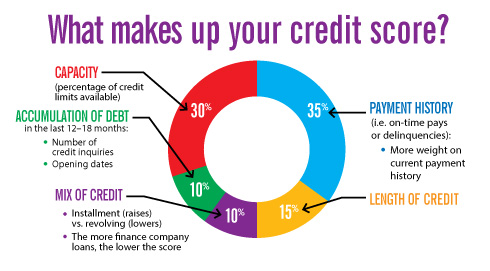1 Thing You Probably Didn't Know About FICO Credit Scores
Do you know how many FICO scores you have? If you said three or fewer, you need to read this.
By Matthew Frankel
How many different FICO credit scores do you have? Many people think they have just one, since there's only one FICO score included in many sources, such as the free score offered by several credit cards. Others think there are three -- one from each credit bureau. While this is true, each bureau actually has several different versions lenders can see. It may surprise you to learn that, in all, you have more than two dozen FICO scores.
Why use FICO and not anything else?
There are several different types of credit scores, but the FICO score, produced by the Fair Isaac Corporation, is the most widely used by far. In fact, the FICO scoring model is used in more than 90% of lending decisions.
To be clear, I'm not saying that non-FICO credit scores can't be useful. The second most popular scoring model, Vantage Score, and others are based on the information in your credit report and can give you a good general idea of where you stand -- great credit, so-so credit, etc. However, it's important to remember that these scores are most likely not what a lender is going to see when you apply for a new credit account.
Within the FICO scoring model, however, you might be surprised at how many different credit scores you have.
The three credit bureaus
There are three different credit bureaus that use the FICO scoring method to generate credit scores from the information in your credit report -- Equifax, Experian, and TransUnion.
Over the past few years, more and more credit card issuers are offering "free FICO scores" as a perk of card membership. While these scores are the real thing, they only represent one of the three credit bureaus (TransUnion seems to be common).
While the only way to see your scores from all three bureaus side by side is usually to pay for it, you can view your full credit reports from all three bureaus once per year, absolutely free, at www.annualcreditreport.com. This is truly a free service -- not a sales gimmick for a credit monitoring service, so take advantage to make sure that all three of your credit reports are error-free.
But that's not all
In addition to having FICO scores from all three credit bureaus, there are several versions of your FICO score generated by each one.
For starters, these include updated versions of the FICO scoring model, as the formula has been fine-tuned over the years. The most popular version currently in use is known as FICO Score 8, but FICO recently released FICO Score 9, which incorporates certain changes. To name the major differences, FICO Score 9 doesn't count paid collection accounts against you, places less emphasis on unpaid medical bills than the previous version, and counts payment histories on rental housing if it's reported. Some lenders have started using FICO Score 9, but it's not widespread just yet.
There are also industry-specific FICO scores for auto lending, credit card decisions, and mortgage lending. For example, an auto-specific FICO score might emphasize a borrower's previous history with auto loans and leases over other credit information.
- Auto lenders use the FICO Auto Score, and the version depends on the credit bureau. FICO Auto Score 8 is used with all three bureaus, but each has another, previous version available as well.
- Credit card issuers can use the FICO Bankcard Score 8 with all three bureaus, and versions 2, 4, and 5 can be used as well, depending on which bureau they're using to check your credit. In addition, Experian also uses FICO Score 3 for credit card purposes.
- Finally, mortgage lenders use one of three versions of the FICO score -- FICO Score 2 (Experian), FICO Score 5 (Equifax), or FICO Score 4 (TransUnion).
Wait, I have how many different FICO scores?
Between all three credit bureaus, and including the different versions of the FICO score that are used by various types of lenders, there are 28 different FICO scores. And this just includes versions that are commonly used by lenders today -- there could be lenders using outdated versions of these scores as well.
The bottom line is that even if you know what your FICO score is, there's no way of knowing specifically which version a lender is going to be looking at. You can see all your FICO scores on websites such as myFICO.com (for a fee), and there may be some variation between the scores, so it may be worth checking out the full picture of your FICO situation if you're planning to make a large purchase anytime soon.
To view the original article, visit The Motley Fool.


/about/dark-stain-application-on-new-oak-hardwood-floor-184881406-573e139f5f9b58723d7a472d.jpg)
